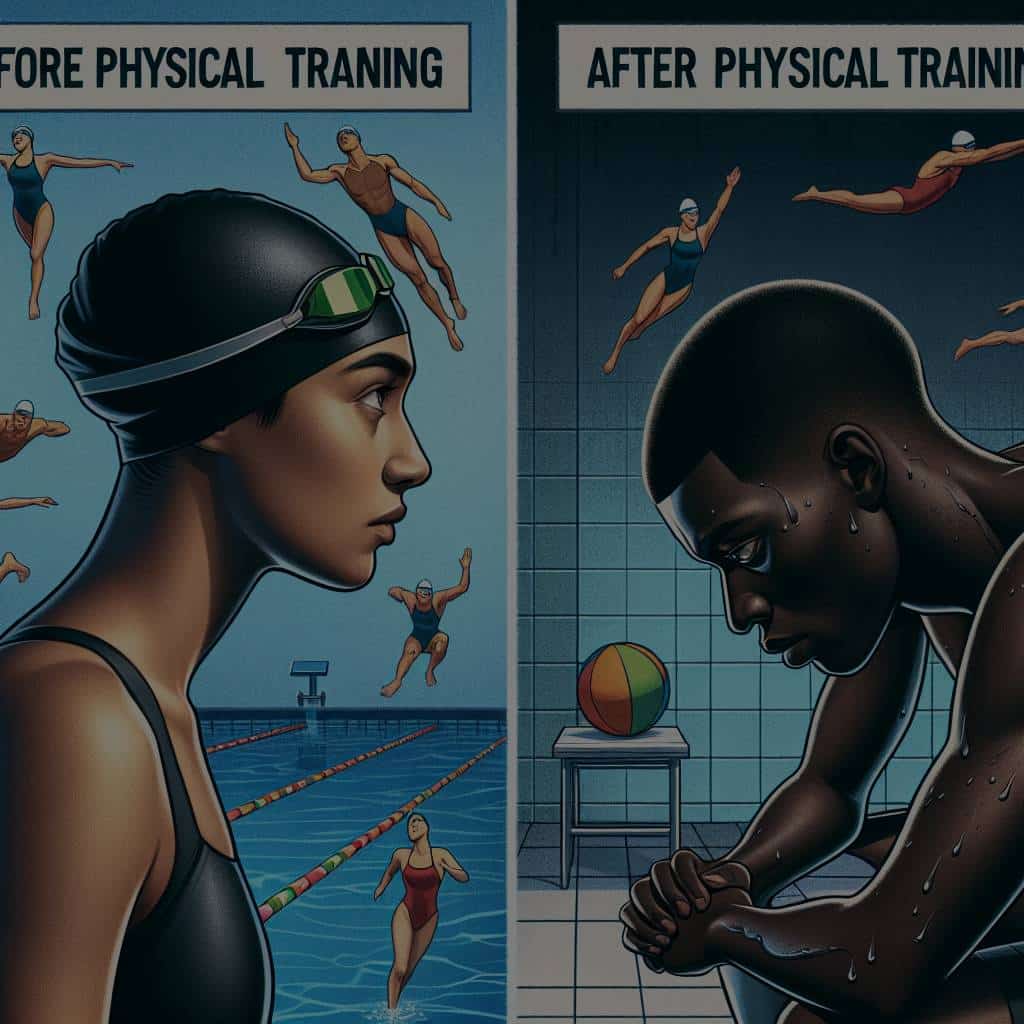In the realm of athletic performance, mental training is an area that has been receiving increasing attention. This focus on the mind, specifically the use of visualization or imagery, has been shown to significantly improve the performance of athletes across different sports. A crucial question that arises for these athletes and their coaches is whether it is more beneficial to practice this mental training before or after physical training. In this article, we will delve into this question particularly in regards to swimmers.
The Power of Mental Training and Visualization in Sports
Before examining the timing of mental training, let’s take a moment to review what it is and why it matters in sports performance. Mental training involves various techniques designed to enhance an athlete’s psychological readiness for competition. Visualization, or imagery, is a form of mental training where athletes mentally rehearse their sport-specific skills.
Also to see : What Techniques Are Olympic Coaches Using to Improve Concentration in Biathletes?
In swimming, for instance, athletes might visualize the entire process of a race, from the dive start to the touch finish, and even the feeling of water resistance against their bodies. They may imagine the sound of the starting gun, the sensation of water rushing past their skin, and the sight of the pool’s finish line. The goal is to create as vivid and detailed imagery as possible.
Research has shown that mental training can have powerful effects on performance. A review of studies on imagery in sports found that it can improve concentration, decrease anxiety, enhance motivation, and boost confidence. It can also improve technical skills, strategy application, and even physical strength.
Additional reading : What Specific Training Does a Biathlete Need to Switch from Sprint to Pursuit Races?
The Role of Mental Training in Swimming Performance
Now, let’s dive deeper into the role of mental training specifically in swimming. Swimmers face unique physical and mental challenges: the need for precise technique, the monotony of training laps, the pressure of time, and the intense competition. Mental training, particularly visualization, can play a significant role in addressing these challenges.
By mentally rehearsing their strokes, turns, and breathing patterns, swimmers can improve their technical abilities without additional physical strain. Visualizing successful races can build confidence and motivation, helping swimmers to push through tough workouts and high-pressure race situations.
Moreover, mental training can help swimmers manage time better. Visualizing a race with a specific time goal can help swimmers internalize the pace they need to maintain. It can also help them rehearse how they will manage their energy levels throughout the race, an important factor in swimming.
Timing of Mental Training: Before Physical Practice
The next question is, when should swimmers engage in mental training? Let’s first consider the benefits of mental training before physical practice.
Engaging in visualization before physical training can serve as a mental warm-up, helping athletes to focus and prepare for the session ahead. It can help swimmers set their intentions for their practice, visualize their technique goals, and anticipate potential challenges. It can also help them get into the right mindset, enhancing their motivation for the upcoming training.
Before a race, mental training can also be highly beneficial. Swimmers can visualize the race unfolding exactly as they want it to, from their technique to their pacing to their finish. This can help them enter the race with greater confidence and clarity, potentially enhancing their performance.
Timing of Mental Training: After Physical Practice
Now, let’s consider the potential benefits of mental training after physical practice. Visualization after training can serve as a mental cool-down, helping swimmers to process and consolidate the skills they have just practiced. It allows swimmers to mentally review their training, reflecting on what they did well and what they could improve.
After a race, mental training can also be valuable. Swimmers can review their race performance in their minds, identifying areas of strength and areas for improvement. This can enhance their learning from the race, helping them to perform better in future competitions.
In the end, whether mental training is more effective before or after physical training for swimmers may depend on the individual athlete and their specific needs and preferences. Some swimmers may find it more helpful to visualize before they hit the pool, while others may benefit more from a mental review after their physical exertion. Regardless of the timing, the crucial point is that mental training is a powerful tool that can significantly enhance swimming performance.
Delving Deeper: A Closer Look at The Research About Mental Training Timing
To understand the timing of mental training, let’s look at the research that has been done in the field. Majority of studies have focused on the effects of mental training, but a few have also examined the optimal timing of mental imagery.
In a study published in the Journal of Sport & Exercise Psychology, researchers observed the impact of imagery training on the performance of skilled athletes. They divided the athletes into two groups: the first group practiced mental imagery before physical practice, while the second group practiced mental imagery after physical practice. The findings were intriguing; both groups demonstrated improvements in performance, but the group that practiced mental imagery before physical practice appeared to benefit more.
In contrast, another study published in Sport Exercise and Performance Psychology found that mental rehearsal after physical training was more beneficial. The researchers suggested that mental rehearsal after physical practice allowed the athletes to consolidate their newly learned skills better.
In the realm of swimming, a study by Olivier Poirier suggested that imagery training might be more effective when used in conjunction with physical training rather than as a separate window of practice. This suggests that the efficacy of mental training for swimmers might be maximized when it’s intertwined with physical training, as opposed to strictly before or after.
These findings highlight the complex nature of understanding the timing of mental training. The timing that yields the best results may ultimately depend on the individual athlete’s imagery ability, their sports performance goals, and their personal preference.
Conclusion: Mental Training as an Integral Part of Swimming Performance
In conclusion, mental training is undeniably a powerful tool to enhance athletic performance. It offers swimmers a unique way to improve their technique, manage their time, boost their confidence, and enhance their muscle strength.
The timing of mental training, whether before or after physical training, appears to be a nuanced issue. While some research suggests that mental rehearsal before physical practice may be more beneficial, other studies indicate that it might be more effective after physical practice. The use of mental imagery in conjunction with physical practice also seems promising.
As we navigate through the waters of research and practice, it is crucial to remember that every athlete is unique. Their mental preparation needs and responses to mental training will vary. Therefore, coaches and athletes should approach mental training on a case-by-case basis, considering the athlete’s imagery ability, sports performance goals, and personal preferences.
Ultimately, regardless of when it is practiced, mental training plays a crucial role in swimming performance. Whether it’s picturing the perfect dive, the precise stroke, or the victorious touch finish, mental imagery can make a significant difference in an athlete’s performance. Let’s continue to explore, learn, and apply mental training strategies in the world of swimming and beyond.






